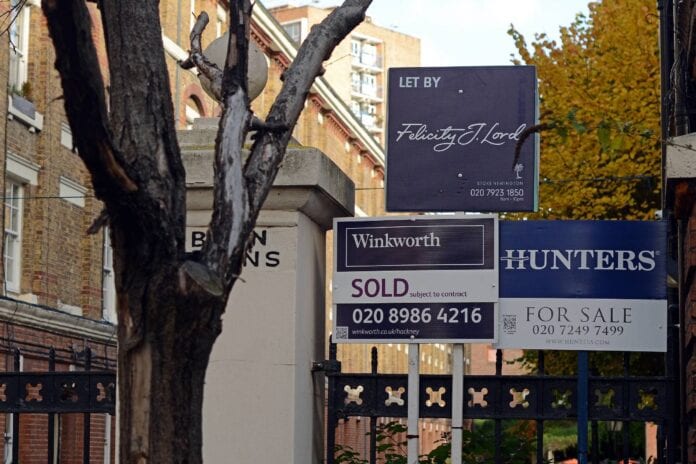Research by the leading mortgage broker for global high-net-worths, Enness Global Mortgages, has revealed how house prices have performed under the last three London Mayors, ahead of Thursday’s mayoral election.
Enness analysed house price growth from the start and end of each term running back over the last five terms and three individuals to have held the position.
The figures show that with the exception of Boris Johnson’s first term as Mayor and one that started in the midst of a property market crash, Sadiq Khan has presided over the worst period of house price growth in the capital.
Since he took office in May 2016, London house prices have climbed just 6.2%. While prices climbed by just 3% during Johnson’s first term between May 2008 and 2012, his second term did see them increase by a far steeper 54% until Khan took over in 2016.
During Johnson’s total time in the role, London house prices increased by 58% between May 2008 and 2016. This rate of growth has been surpassed by one man though. During Ken Livingstone’s two terms as Mayor of London between May 2000 and 2004, house prices in the capital shot up by 110%.
Interestingly, the rate of growth under Livingstone as an independent Mayor of London sat at 61% during his first term. This then fell to just 30% during his second term when he held the position as a Labour Mayor of London.
Despite an overall lower rate of growth, house prices in some boroughs have climbed notably during Sadiq Khan’s time in office. In Barking and Dagenham the average house price has increased 21% since 2016, while Newham (19%) and Waltham Forest (18%) have also seen some of the largest increases.
This hasn’t been the case everywhere though. The City of London (-20%), Hammersmith and Fulham (-15%), Kensington and Chelsea (-5%) and Westminster (-1%) have all seen house prices decline.
CEO of Enness Global Mortgages, Islay Robinson, commented:
“It’s perhaps unfair to say that Said Khan has been the worst London Mayor in over two decades where property price growth is concerned and a comparison would mean allowing him a second term in the role.
That said, there certainly seems to be some correlation between a Labour Mayor of London and a poor performing property market in the capital.
Of course, we can only go based on what the numbers tell us and in the case of Sadiq Khan, he certainly seems to have helped stimulate boroughs at the bottom end of the property price ladder, while London’s prime boroughs have actually seen values fall during his time in office.”
Table shows house price change across each term held by each London Mayor (Source: UK House Price Index)
| Mayor | Political party | Term start | Average London house price | Term end | Average London house price | Change % | Total Change (%) |
| Ken Livingstone | Independent | 4-May-00 | £140,862 | 4-May-04 | £227,330 | 61% | 110% |
| Ken Livingstone | Labour | 4-May-04 | £227,330 | 4-May-08 | £295,163 | 30% | |
| Boris Johnson | Conservative | 4-May-08 | £295,163 | 9-May-12 | £304,081 | 3% | 58% |
| Boris Johnson | Conservative | 9-May-12 | £304,081 | 9-May-16 | £467,485 | 54% | |
| Sadiq Khan | Labour | 9-May-16 | £467,485 | Present | £496,269 | 6% | 6% |
Table shows house price growth across each London borough during each term held by each London Mayor (Source: UK House Price Index)
| Borough | Ken Livingstone | Ken Livingstone | Boris Johnson | Boris Johnson | Sadiq Khan |
| May 2000 to May 2004 | May 2004 to May 2008 | May 2008 to May 2012 | May 2012 to May 2016 | May 2016 to present | |
| Barking and Dagenham | 105.5% | 25.4% | -14.0% | 61.0% | 21% |
| Newham | 100.4% | 22.9% | -4.7% | 61.2% | 19% |
| Waltham Forest | 84.7% | 26.7% | -4.5% | 76.3% | 18% |
| Redbridge | 80.8% | 23.2% | -2.6% | 46.0% | 17% |
| Bexley | 74.5% | 22.0% | -7.2% | 57.1% | 16% |
| Sutton | 59.5% | 25.7% | -4.3% | 52.7% | 15% |
| Hackney | 67.7% | 51.2% | -2.4% | 62.8% | 14% |
| Lewisham | 76.5% | 28.6% | 0.6% | 70.1% | 13% |
| Havering | 78.5% | 23.5% | -8.2% | 53.3% | 12% |
| Croydon | 66.8% | 23.4% | -8.5% | 59.1% | 12% |
| Greenwich | 74.2% | 28.2% | -1.5% | 59.5% | 12% |
| Ealing | 55.7% | 27.4% | 2.3% | 51.1% | 11% |
| Merton | 53.1% | 35.1% | 0.1% | 64.4% | 10% |
| Hounslow | 59.8% | 28.0% | -4.2% | 49.6% | 10% |
| Hillingdon | 64.5% | 21.1% | -0.8% | 55.1% | 10% |
| Bromley | 57.1% | 22.4% | -2.1% | 53.1% | 9% |
| Islington | 49.0% | 40.1% | 13.5% | 42.4% | 9% |
| Haringey | 61.6% | 37.5% | 5.8% | 55.6% | 8% |
| Enfield | 69.5% | 23.3% | -4.5% | 58.1% | 6% |
| Southwark | 64.2% | 36.6% | 10.5% | 56.6% | 5% |
| Harrow | 64.1% | 24.1% | -3.4% | 52.2% | 5% |
| Richmond upon Thames | 38.6% | 36.6% | 4.6% | 46.5% | 5% |
| Lambeth | 48.8% | 40.1% | 7.0% | 57.7% | 4% |
| Kingston upon Thames | 51.9% | 28.9% | 0.9% | 53.3% | 3% |
| Brent | 67.9% | 26.4% | 1.5% | 61.7% | 3% |
| Camden | 37.9% | 47.4% | 13.9% | 40.2% | 2% |
| Tower Hamlets | 52.5% | 47.7% | -14.5% | 64.5% | 1% |
| Wandsworth | 45.6% | 40.2% | 7.1% | 52.2% | 1% |
| Barnet | 62.3% | 25.7% | 4.6% | 51.0% | 0% |
| Westminster | 48.5% | 39.2% | 23.4% | 51.5% | -1% |
| Kensington and Chelsea | 27.7% | 55.7% | 28.1% | 31.6% | -5% |
| Hammersmith and Fulham | 40.9% | 39.5% | 14.0% | 40.1% | -15% |
| City of London | 60.0% | 39.2% | 47.2% | 47.4% | -20% |
| London | 61.4% | 29.8% | 3.0% | 53.7% | 6% |
| Inner London | 56.2% | 39.4% | 7.1% | 55.2% | 4% |
| Outer London | 65.8% | 25.9% | -2.5% | 55.9% | 10% |
Help keep news FREE for our readers
Supporting your local community newspaper/online news outlet is crucial now more than ever. If you believe in independent journalism, then consider making a valuable contribution by making a one-time or monthly donation. We operate in rural areas where providing unbiased news can be challenging. Read More About Supporting The West Wales Chronicle

























